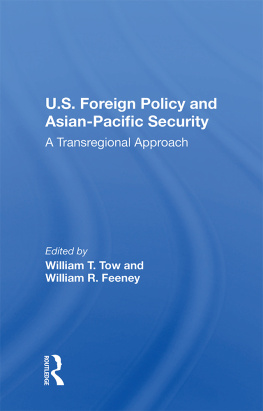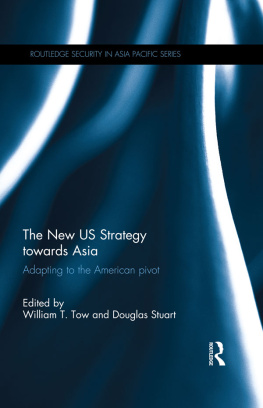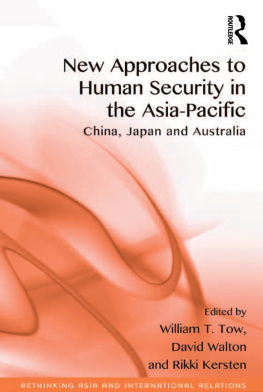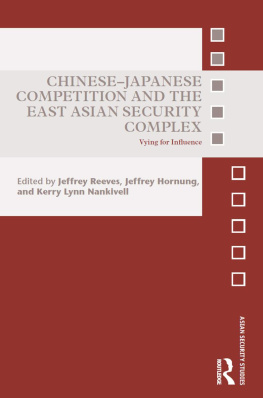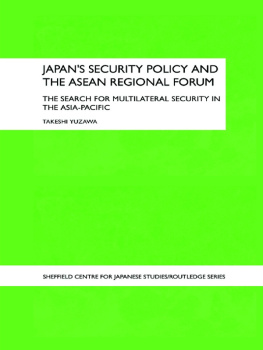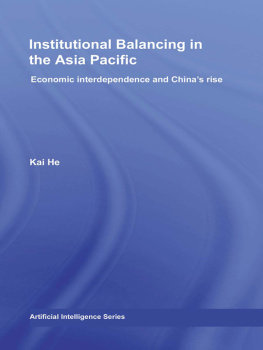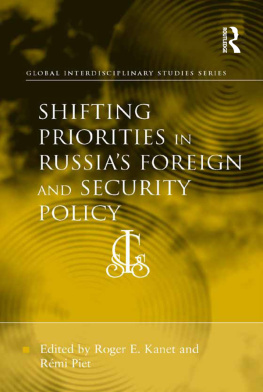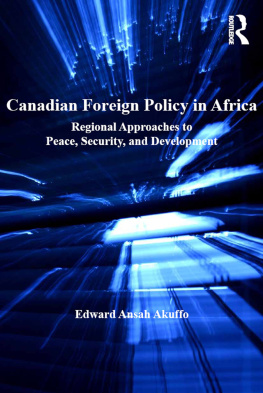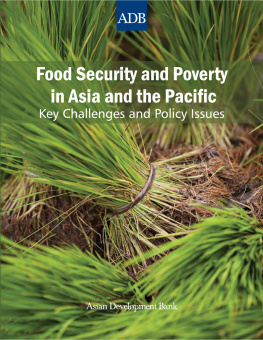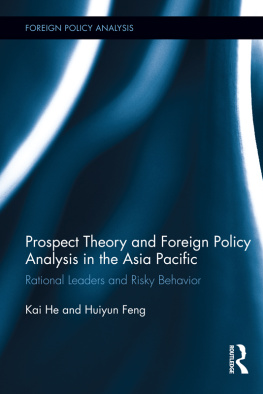U.S. Foreign Policy and Asian-Pacific Security
Also of Interest
Critical Energy Issues in Asia and the Pacific: The Next Twenty Years, Fereidun Fesharaki, Harrison Brown, Corazon M. Siddayao, Toufiq A. Siddiqi, Kirk R. Smith, and Kim Woodard
Military Power and Policy in Asian States: China, India, Japan, edited by Onkar Marwah and Jonathan D, Pollack
Arms Control and Defense Postures in the 1980s, edited by Richard Burt
* China Among the Nations of the Pacific, edited by Harrison Brown
* China in World Affairs: The Foreign Policy of the PRC Sinoe 1970, Golam W. Choudhury
Resources and development in the Indian Ocean Region , edited by Alex Kerr
* The Chinese Military System: An Organizational Study of the Chinese People's Liberation Army, Second, Revised Edition, Harvey W. Nelsen
* The Indian Ocean in Global Politics, edited by Larry W. Bowman and Ian Clark
Communist Armies in Politics: Their Origins and development, edited by Jonathan R. Adelman
The Red Navy at Sea: Soviet Naval Operations on the High Seas, 1956-1980, Bruce W. Watson
Encounter at Shimoda: Search for a View Pacific Partnership, edited by Herbert Passin and Akira Iriye
* U.S.-Japan Relations and the Security of East Asia: The New Decade, edited by Franklin B. Weinstein
The Third Indochina Conflict, edited by David W. P. Elliot
* The Security of Korea: U.S. and Japanese Perspectives on the 1980s, edited by Franklin B. Weinstein and Fuji Kamiya
* China, the Soviet Union , and the West: Strategic and Political Dimensions for the 1980s, edited by Douglas T. Stuart and William T. Tow
* The Armed Forces of the USSR, Second Edition, Revised and Updated, Harriet Fast Scott and William F. Scott
*Available in hardcover and paperback.
Westview Special Studies in National Security and Defense Policy
U.S. Foreign Policy and Asian-Pacific Security: A Transregional Approach
edited by William T. Tow and William R. Feeney
The Reagan administration has indicated clearly that the United States will reassert its strategic presence in Asia and the Pacific at levels not equaled since the close of the Vietnam conflict. The implications of this policy bear careful examination in light of the growing divergence between U.S. security perceptions and those of our European and Asian allies. The dynamics of evolving U.S.-Japanese differences over the size of Tokyo's defense expenditures and force levels; ASEAN's reluctance to accept Washington's developing security ties with Beijing; the potential extension of the scope of the ANZUS alliance to include northeast Asia, the northwest Indian Ocean, and possibly the Middle East; the emerging West European involvement in Asian-Pacific defense matters; and the problems of U.S. military basing arrangements are all issues that merit increased attention as we move through the 1980s.
This original collection is one of the first comprehensive attempts to identify and synthesize these issues and to analyze their importance to future U.S. strategic approaches to Asian-Pacific security. The underlying theme of the study is that, by reason of its history, geography, and national interests, the United States is compelled to remain an Asian-Pacific power and to play an active role in shaping that region's future in ways that will enhance transregional modes of strategic and economic cooperation.
Dr. William T. Tow is visiting assistant professor in the German Graduate Program (Munich) of the School of International Relations, University of Southern California. He is coeditor of China, the Soviet Union, and the West (Westview, 1981). Dr. William R. Feeney is associate professor in the Department of Government and Public Affairs at Southern Illinois University at Edwardsville. He has contributed articles to several recent books on China and Sino-American relations.
U.S. Foreign Policy and Asian-Pacific Security
A Transregional Approach
edited by William T. Tow and William R. Feeney
First published 1982 by Westview Press, Inc.
Published 2018 by Routledge
52 Vanderbilt Avenue, New York, NY 10017
2 Park Square, Milton Park, Abingdon, Oxon OX14 4RN
Routledge is an imprint of the Taylor & Francis Group, an informa business
Copyright 1982 Taylor & Francis
All rights reserved. No part of this book may be reprinted or reproduced or utilised in any form or by any electronic, mechanical, or other means, now known or hereafter invented, including photocopying and recording, or in any information storage or retrieval system, without permission in writing from the publishers.
Notice:
Product or corporate names may be trademarks or registered trademarks, and are used only for identification and explanation without intent to infringe.
Library of Congress Catalog Card Number: 82-050179
ISBN 13: 978-0-367-21230-8 (hbk)
Contents
William T. Tow and William R. Feeney
William T. Tow
Stephen P. Gibert
Robert L. Rau
Sheldon W. Simon
Henry S. Albinski
William R. Feeney
William T. Tow and William R. Feeney
HENRY S. ALBINSKI is Professor of Political Science at The Pennsylvania State University and Director of the Office for Australian Studies. He also has been a Visiting Fellow at the Research School of Pacific Studies at the Australian National University, a Rockefeller Fellow, a Fulbright Scholar, and a consultant for the Institute of Defense Analyses, the Research Analysis Corporation, and the U.S. Department of State. He has published seven books, numerous monographs, and over sixty book or journal contributions on a broad range of international topics.
WILLIAM R. FEENEY is Associate Professor of Government at Southern Illinois University at Edwardsville. He is a contributor to Gene T. Hsiao, ed. The Sino-American Detente and Its Policy Implications (1974); Samuel S. Kim and James C. Hsiung, eds. China in the Global Community (1980); and Gene T. Hsiao and Michael Witunski, eds. Sino-American Normalization and Its Policy Implications (forthcoming). He has written articles for Asian Survey , Asian Profile , Korea & World Affairs , Asian Thought & Society , and Current Scene .
STEPHEN P. GIBERT is Professor of Government, Director of the National Security Studies Program, and a member of the International Research Council of the Center for International and Strategic Affairs at Georgetown University. He is also co-editor of International Security Review . He is author of Northeast Asia in U.S. Foreign Policy , Soviet Images of America , and co-author of Arms for the Third World . He also has written numerous articles on foreign policy and international security affairs for various journals.
ROBERT L. RAU is Associate Professor of Political Science at the U.S. Naval Academy. He has served as a consultant for the Office of the Secretary of Defense and for Los Alamos Laboratories. He also has been a guest researcher and lecturer at the Institute of Southeast Asian Studies in the University of Singapore as well as a Fulbright Scholar. He has published articles on Asian affairs in Asian-Pacific Community , Contemporary Southeast Asia , and many other journals.
SHELDON W. SIMON is Professor of Political Science at Arizona State University and Director of its East Asian Studies Center. He edited The Military and Security in the Third World: Domestic and International Impacts (Westview Press) and has authored several other books including the forthcoming ASEAN States and Regional Security . He regularly contributes to Asian Survey , Orbis , and other journals.


